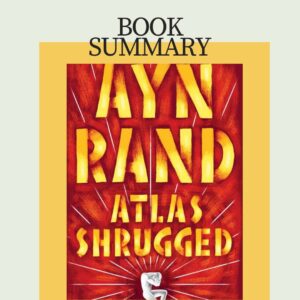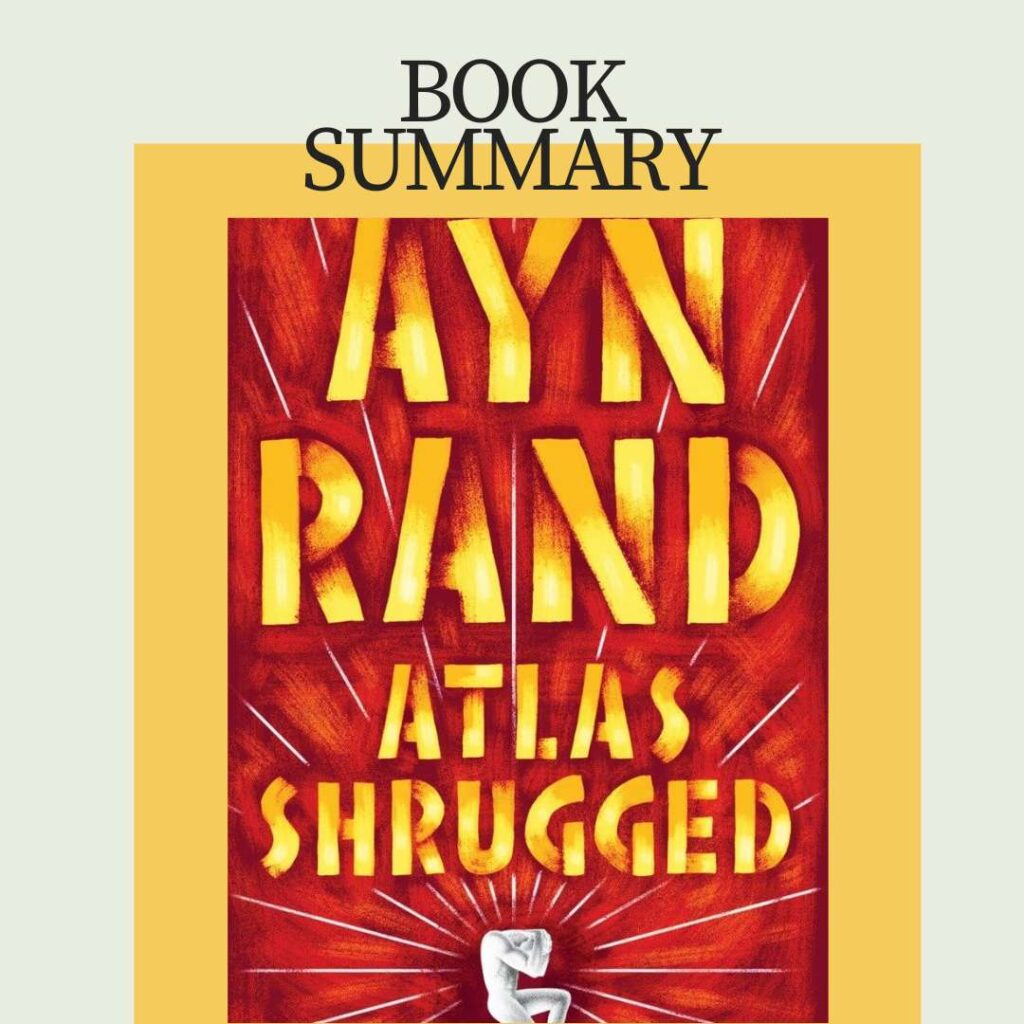Atlas shrugged summary
Atlas Shrugged, written by Ayn Rand, is a classic novel that delves into philosophical themes such as objectivism and the consequences of a collectivist society. The story explores the struggle of individuals against the pressures of a dystopian world dominated by government control and societal norms.
The Purpose and Plot of Atlas Shrugged
The main purpose of Atlas Shrugged is to challenge conventional morality and advocate for individualism over collectivism.
The plot revolves around a mysterious figure named John Galt who leads a rebellion of innovators and business leaders against a corrupt system that stifles their talents and ambitions.

Table of Contents
The Uniqueness of Atlas Shrugged Book
Atlas Shrugged is unique in its presentation of ideological conflicts through intricate character dynamics and philosophical dialogue.
The novel’s narrative structure blends mystery, romance, and political intrigue, creating a compelling and thought-provoking reading experience.
Brief Author Biography
Ayn Rand was a Russian-born American writer and philosopher known for her radical individualism and advocacy of capitalism.
She immigrated to the United States in the 1920s and later gained fame for her novels and philosophical treatises.
Ayn Rand’s Philosophy and its Influence on Atlas Shrugged
Rand’s objectivist philosophy emphasizes rational self-interest and the vital role of individual achievement in society.
Atlas Shrugged reflects these ideas through its strong-willed characters and exploration of the consequences of collectivism.
The Impact of Atlas Shrugged on Ayn Rand’s Career
Atlas Shrugged solidified Ayn Rand’s reputation as a controversial and influential thinker in the realms of literature and philosophy.
The novel sparked debate and critical analysis of Rand’s ideas, contributing to her enduring legacy in intellectual circles.
Overview of Atlas Shrugged
The Premise of Atlas Shrugged
- Atlas Shrugged is set in a dystopian future where government intervention and regulatory controls have crippled innovation and individual freedom.
- The story follows the journey of key figures such as Dagny Taggart and Hank Rearden as they navigate a world on the brink of collapse.
Main Characters in Atlas Shrugged
- Dagny Taggart: A resilient and determined railroad executive committed to preserving her family’s legacy.
- Hank Rearden: An innovative and idealistic steel magnate who faces opposition from both business rivals and government forces.
- John Galt: A mysterious and enigmatic figure who symbolizes the rebellion against societal norms and the status quo.
The Setting and Time Period of Atlas Shrugged
- Atlas Shrugged unfolds in a mid-20th century America fraught with economic turmoil and political upheaval.
- The novel’s industrial backdrop and technological advancements underscore the clash between progress and regression in society.
Detailed Summaries of Each Part of Atlas Shrugged
Summary of Part 1: Non-Contradiction in Atlas Shrugged
- Part 1 of Atlas Shrugged introduces readers to the struggles of industrialists like Dagny Taggart and Hank Rearden as they confront government interference and corporate corruption.
- Themes of integrity and moral dilemmas are explored through the characters’ choices and actions in a world rife with hypocrisy and deception.
Summary of Part 2: Either-Or in Atlas Shrugged
- Part 2 delves deeper into the philosophical conflicts driving the narrative, particularly the choice between individualism and collectivism.
- The actions of characters like Dagny and Hank serve as catalysts for larger social upheaval, highlighting the consequences of ideological divides.
Summary of Part 3: A is A in Atlas Shrugged
- Part 3 of Atlas Shrugged brings the narrative to a climax as the heroes and villains face off in a final confrontation over the future of society.
- The novel culminates in a revolutionary event that challenges norms and redefines the balance of power in the world of Atlas Shrugged.
Deep Dive into Main Characters
Understanding the Characters of Atlas Shrugged
- John Galt: The enigmatic figure behind the strike, embodying the characteristics of the ideal man according to Ayn Rand’s philosophy of Objectivism.
- Dagny Taggart: A strong-willed and determined railroad executive, who symbolizes the struggle between individualism and collectivism.
- Hank Rearden: A successful industrialist who faces moral dilemmas while striving to protect his innovations against government interference.
- Francisco d’Anconia: A wealthy heir to a copper empire, who challenges traditional notions of success and virtue.
- Ellsworth Toohey: A prominent journalist and critic whose manipulative tactics represent the dangers of collectivist ideologies.
Character Development and Its Impact on the Story
- Dynamic Arcs: The characters evolve throughout the narrative, confronting moral challenges and ideological conflicts that shape their choices.
- Symbolism: Each character represents a distinct facet of Rand’s philosophical beliefs, illustrating contrasting perspectives on individualism, capitalism, and ambition.
- Interactions: The relationships between characters reveal the complexities of human nature and the consequences of their beliefs on society.
- Conflict Resolution: The characters’ decisions and actions culminate in a dramatic resolution that reflects Rand’s views on the power of individual agency and the pursuit of rational self-interest.
Themes and Symbolism
Main Themes Explored in Atlas Shrugged
- Individualism vs. Collectivism: The central theme of the novel, exploring the tension between personal liberty and societal control.
- Capitalism and Innovation: Rand’s celebration of entrepreneurial spirit and free-market principles as drivers of progress and prosperity.
- Morality and Egoism: The ethical dilemmas faced by characters in navigating their personal values against societal expectations.
- Rebellion and Revolution: The call to action for individuals to assert their independence and challenge oppressive systems.
Symbolism and Its Significance in Atlas Shrugged
- The Railroad: Symbolizing progress, innovation, and the interconnectedness of individuals in a capitalist society.
- The Sign of the Dollar: Representing the value of one’s labor and the intrinsic worth of individual achievement.
- The Taggart Transcontinental: Reflecting the struggle between innovation and government regulations in the industrial landscape.
- The Rearden Metal: Signifying the power of human ingenuity and the quest for excellence in the face of adversity.
Critiques and Reception
Critical Reception of Atlas Shrugged
- Philosophical Depth: Critics acknowledge Rand’s provocative exploration of philosophical ideas, though some argue its presentation lacks subtlety.
- Characterization: While praised for its strong characters, some critics find them one-dimensional or as mere mouthpieces for Rand’s ideology.
- Narrative Structure: The novel’s length and repetitive exposition have been subject to criticism, with some readers finding it overly didactic.
Public Reception of Atlas Shrugged
- Cultural Influence: The novel has sparked debates and influenced discussions on politics, economics, and individual rights.
- Controversy: Rand’s uncompromising defense of individualism and capitalism has polarized opinions, drawing both ardent supporters and vehement critics.
- Longevity: Despite initial mixed reviews, Atlas Shrugged has endured as a classic of libertarian literature, captivating generations with its enduring themes and characters.
Influence and Legacy of Atlas Shrugged
The Cultural Impact of Atlas Shrugged
- Literary Influence: The novel’s themes and characters have permeated popular culture, inspiring adaptations, references, and discussions in various media.
- Political Discourse: Rand’s philosophy of Objectivism continues to influence political movements and debates on the role of government in society.
- Entrepreneurial Spirit: The novel celebrates the virtues of entrepreneurialism and individual achievement, resonating with proponents of free-market capitalism.
The Legacy and Continued Relevance of Atlas Shrugged
- Philosophical Legacy: Atlas Shrugged remains a touchstone for discussions on ethics, capitalism, and individual rights, shaping contemporary debates on these topics.
- Literary Impact: The novel’s enduring popularity and cultural relevance underscore its status as a seminal work in the realm of libertarian literature.
- Global Reach: Translated into multiple languages, Atlas Shrugged has garnered a worldwide readership, sparking dialogue on the virtues of individualism and the perils of collectivism.
FAQs for Atlas Shrugged Summary
What is the main idea of Atlas Shrugged?
The main idea of Atlas Shrugged revolves around individualism, capitalism, and the struggle between producers and looters in a dystopian society.
Who is John Galt in Atlas Shrugged?
John Galt is a central character in Atlas Shrugged who embodies the philosophy of Objectivism and leads a strike of the world’s creative minds against a declining society.
What are the major themes in Atlas Shrugged?
Some major themes in Atlas Shrugged include the importance of individualism, the battle between reason and emotion, the virtues of productive achievement, and the consequences of collectivism.
How does Atlas Shrugged critique society?
Atlas Shrugged critiques society by illustrating the detrimental effects of collectivism, government intervention, and the suppression of individual rights and freedoms.
What is the significance of the title Atlas Shrugged?
The title Atlas Shrugged symbolizes the withdrawal of the world’s innovators and producers who carry the weight of society on their shoulders, implying the consequences of their absence.
Conclusion:
Atlas Shrugged by Ayn Rand is a compelling novel that delves into philosophical themes, individualism, and the consequences of a society deviating from its core principles. Through its intricate plot and memorable characters like John Galt and Dagny Taggart, the book offers a thought-provoking exploration of capitalism, morality, and the human spirit. Whether you’re intrigued by the concept of a dystopian world or seeking a profound reflection on the nature of society, Atlas Shrugged remains a timeless literary masterpiece worth exploring.
Discover marketing services, interviews & publishing tools at SharingStories.



